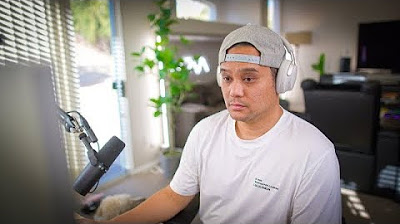How to Build a Startup Without Funding by Pieter Levels
Summary
TLDRPieter Levels 分享了他在过去四年中如何通过自筹资金的方式成功创立了多个初创公司。他强调了利用现有技能和低成本技术资源的重要性,并鼓励听众追求自己的创业梦想。通过讲述自己的个人故事,包括他如何从大学毕业后的无聊状态转变为通过YouTube频道赚取收入,再到因YouTube收入下降而面临财务困境,Levels 展示了他的创业之旅和如何通过创建12个项目来克服抑郁和焦虑。他详细介绍了如何通过解决实际问题来产生创业想法,如何构建和推出产品,并通过社交媒体平台如Product Hunt、Reddit和Hacker News进行推广。Levels 还讨论了关于产品货币化的观点,包括提供付费会员制和赞助模式,并分享了他对于自动化业务流程以减少人工干预的偏好。最后,他鼓励创业者要对自己的直觉有信心,并在社交媒体上保持友善,同时分享了他对于未来自动化和基本收入的看法。
Takeaways
- 🚀 **启动项目的初衷**:Pieter Levels 通过解决自己的问题来启动项目,比如创建Nomad List是因为他需要一个可以旅行和工作的地方的数据库。
- 💡 **创意来源**:他的创意来自于个人生活中的烦恼,比如朋友间通过电子邮件分享音乐的不便,激发了他开发应用程序的灵感。
- 🌐 **技术实现**:利用现有的技术,如互联网,以低成本甚至几乎免费的方式构建项目。
- 🎯 **市场定位**:通过识别并专注于一个小而具体的市场细分领域,逐步扩大业务范围。
- 💸 **盈利模式**:通过会员费用、赞助和Patreon等模式为项目创造收入,强调产品或服务需要能够带来收益。
- 🔍 **用户反馈**:积极与用户互动,通过反馈盒子等方式收集用户意见,并根据反馈调整产品特性。
- 📈 **增长策略**:通过在社交媒体、Product Hunt、Hacker News等平台上发布和推广来增加用户基数。
- 🤖 **自动化**:通过编写脚本来自动处理日常任务,如数据更新和用户交互,提高效率并减少人力需求。
- 🌱 **持续迭代**:不断推出新功能和改进,保持产品的活力和市场竞争力。
- 📊 **数据分析**:监控用户行为和产品表现,使用分析工具来理解用户需求并指导产品发展方向。
- ✅ **执行力**:强调执行力的重要性,即使想法相似,执行的方式和效果将决定项目的成败。
Q & A
什么是自举(bootstrapped)的初创企业?
-自举的初创企业是指没有外部资金支持,仅依靠创始人自己的技能和资源来建立和发展的业务。这种方式不依赖于风险投资或外部资金,而是通过自身的盈利来维持和增长。
为什么技术便宜使得自举初创企业成为可能?
-技术的便宜化,尤其是互联网相关技术,使得建立和运营在线服务的成本大幅降低,几乎可以免费地进行创新和尝试。这样就减少了创业的门槛,让更多人能够尝试自己的创业想法。
Pieter Levels 如何通过自己的方式克服抑郁和焦虑?
-Pieter Levels 通过开展名为 '12 Startups for Fun' 的项目来克服抑郁和焦虑。他决定在一年内启动12个项目,以此作为自我治疗的方式,通过保持忙碌和专注于创造来提升情绪。
Go Fucking Do It 是一个怎样的项目?
-Go Fucking Do It 是一个能够让用户设定目标和期限,并为此下注的项目。如果用户未能在规定时间内达成目标,他们的朋友会收到一个询问邮件,如果朋友说没有完成,用户的信用卡会被收费,费用归项目所有者。
Nomad List 成功的原因是什么?
-Nomad List 成功的原因之一是它满足了数字游民寻找理想工作地点的需求。它提供了一个关于不同城市互联网速度、生活成本和气候的数据平台,并且通过社区驱动的方式不断更新和完善。
为什么 Pieter Levels 推荐在创业时独自工作而不是与他人合作?
-Pieter Levels 认为独自工作可以避免群体思维,让人更专注于实际问题和解决方案。此外,独自工作可以加快执行速度,减少沟通和协调的时间成本。
如何避免在创业时产生群体思维?
-避免群体思维的一个方法是独自工作,这样可以减少团队成员之间的相互吹捧和过度自信。此外,保持批判性思维,不盲目接受团队内的意见,而是通过市场反馈和实际数据来验证想法。
为什么 Pieter Levels 认为创业初期应该独自完成项目?
-Pieter Levels 认为在创业初期独自完成项目可以节省时间,避免群体思维,并加快产品的开发和上市速度。此外,自己完成项目可以更深入地了解产品和市场,从而做出更好的决策。
Pieter Levels 是如何通过远程工作和旅行结合的方式来应对 YouTube 频道收入下降的问题?
-面对 YouTube 频道收入的下降,Pieter Levels 选择了卖掉所有家当,带着笔记本电脑去亚洲旅行,同时寻找新的收入来源。在旅行中,他通过建立多个小项目来尝试不同的收入模式,最终找到了适合自己的创业路径。
为什么 Pieter Levels 认为创业者应该从小问题开始解决?
-Pieter Levels 认为从小问题开始解决可以让创业者更聚焦,因为小问题通常对应着一个较小的市场细分领域,创业者可以在这个领域内成为专家,从而获得竞争优势。此外,小问题更容易被解决和验证,有助于快速迭代和产品改进。
Pieter Levels 提出了哪些关于产品发布的建议?
-Pieter Levels 建议创业者在产品发布时利用大型平台如 Product Hunt、Hacker News 和 Reddit 来吸引用户和媒体的关注。他还建议在发布时要准备好高质量的宣传材料,如动画 .gif 和响亮的口号,并在评论中与用户真诚互动。
为什么 Pieter Levels 认为创业者应该尽早开始赚钱?
-Pieter Levels 认为尽早开始赚钱可以验证产品的市场价值和用户支付意愿。如果一个产品或服务能够让用户愿意付费,这意味着它解决了用户的痛点,并且具有持续增长的潜力。
Outlines

此内容仅限付费用户访问。 请升级后访问。
立即升级Mindmap

此内容仅限付费用户访问。 请升级后访问。
立即升级Keywords

此内容仅限付费用户访问。 请升级后访问。
立即升级Highlights

此内容仅限付费用户访问。 请升级后访问。
立即升级Transcripts

此内容仅限付费用户访问。 请升级后访问。
立即升级浏览更多相关视频

YC Startup Talk for Students, 2022

Pieter Levels — The Indie Hacker’s Guide to AI Startups

The Keys to Stripe’s Success | Collison Brothers Podcast #5

How To Become a Freelance Web Developer 2024 | Step-By-Step Guide

Microsoft Build: Transforming the future of startups with Microsoft AI

How I Started My T-Shirt Business and What I Wish I Knew If I Had to Start Over

Renny Gleeson: 404, the story of a page not found
5.0 / 5 (0 votes)